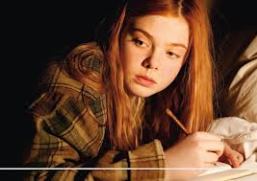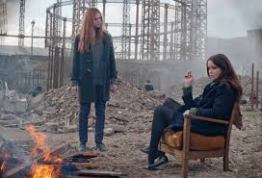Edit: Throughout the first part of the movie Ginger and Rosa are so close that they even wear the same things. But people change, they have to. As each girl discovers more her own individual identity they realize that the things that bonded them together as children can no longer bond them as adults. Is the ending of their friendship inevitable?
They said Elle Fanning would be sensational, and they did not lie. I just saw Ginger & Rosa directed by Sally Potter for today’s installment of 4$ Tuesday.
*Spoiler Alerts*
In 1960s London, at the height of the Cuban Missile Crisis, Ginger and Rosa are best friends and do everything together. Ginger, played phenomenally by Elle Fanning, is a budding activist who is deeply disturbed by the state of the world and is internalizing the stress of it all with the growing intensity and despair in the way that only revolutionary young adults do. She is a child in a world in which she sees no other choice but to be the grown up, in the micro-sense because of her dysfunctional parents inability to be adults and in the macro-sense as she confronts the government’s irresponsible and potentially lethal actions.
Rosa is religious and prefers a peaceful approach to the war over Ginger’s urgent need for forceful action. She’s flirtatious with boys and embraces her sexuality inclinations without much thought to the consequences and likewise unperturbed by the consequences in the end. Rosa develops a flirtation with Ginger’s father, Roland. Rosa and Ginger begin to drift apart as Ginger becomes closer to the activist movement and Rosa becomes closer to Ginger’s father. As Rosa and Roland develop an intimate relationship, Ginger struggles to cope with the deceit of her friend and family. Roland is a revolutionary whose articles are respected by Vietnam protesters. He tells Ginger “Every man must fight for his own authority, his own autonomous thoughts. Which means you shouldn’t listen to a word I say.”
Roland’s immaturity and hypocrisy show through when he tries to convince Ginger to understand him and his life philosophy, which has dictated his carpe diem actions even at the expense of his daughter’s lifelong friendship and well-being. The ending makes you wonder if Ginger has forgiven him. I don’t believe she does because the “I forgive you” that we hear narrated is from a poem to Rosa and does not depart from its train of thought to address Roland, who is in the scene by circumstance.
As strong as Elle Fanning’s performance is in this film, the weak points rest on newcomer Alice Englert’s character, Rosa. The film had the opportunity to explore the complexity of Rosa, but instead I was left feeling like I just could never get on her side because it was never made to feel appealing or logical. Instead we are left with a bitter taste in our mouths for a girl who has so easily hurt her friend and thrown their friendship away. Was there no internal struggle there? Rosa is delusional and thinks she can help Roland and that they are bonded by something other than a physical attraction. I wanted to feel Rosa’s pain, her conflicting emotions towards her friend and the tension of her budding sexuality pulling her to Roland. I didn’t get any of this. Instead it was more like a you-don’t-particularly-care-about-your-friends’-feelings-and-the-consequences-of-your-actions-plus-you’re-a-slut kinda vibe. When it comes to the war, Rosa is a pacifist, who chooses prayer over protest, religion over rebellion. Meanwhile, the intensity of Ginger’s emotions come across clearly, twisted and raw from the many stresses in her life that cannot be pushed away through prayer and attention from boys.
Christina Hendricks, who plays Ginger’s mother, gives a fairly weak performance, using a British accent that sounds authentically forced.
Overall though, I really did enjoy this film. I walked away considering my own point in time and the stresses in my own life. I relate to Ginger and her desperation. Though not the 1960s. the crisis of my generation is that of overpopulation, starvation, contamination, and climate change. I used to feel constant desperation and now I often feel hopeless. The human race is facing the greatest test: Our imminent mortality on a massive scale. There is only a matter of time before mass migration and wars over clean water cause issues more pressing than ever before. And there are days when I feel like I will explode too. And I have no answers.
Favorite Quotes:
-I think we should do something about the bomb, you know, protest.
-I think we should pray.
Can’t you be a girl for just a minute or two longer?
There’s poetry in small spaces… a beauty in confinement.
But I don’t want to die, I want to grow up and do things!
Happy is not really an option when the whole world is about to be blown to pieces.
I’d prefer the world not to end, wouldn’t you?
And I will say, “I loved you, Rosa.”
It’s worth seeing despite it’s weak points.
hsg


